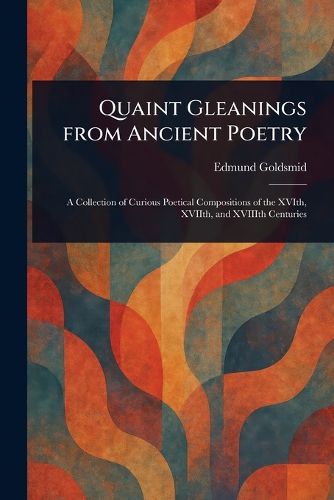Readings Newsletter
Become a Readings Member to make your shopping experience even easier.
Sign in or sign up for free!
You’re not far away from qualifying for FREE standard shipping within Australia
You’ve qualified for FREE standard shipping within Australia
The cart is loading…






This title is printed to order. This book may have been self-published. If so, we cannot guarantee the quality of the content. In the main most books will have gone through the editing process however some may not. We therefore suggest that you be aware of this before ordering this book. If in doubt check either the author or publisher’s details as we are unable to accept any returns unless they are faulty. Please contact us if you have any questions.
"Quaint Gleanings from Ancient Poetry," compiled by Edmund Goldsmid, offers a fascinating journey through three centuries of English verse. This anthology presents a carefully curated selection of poetical compositions from the 16th, 17th, and 18th centuries. Discover curious and often overlooked works, providing a unique perspective on the evolution of English poetry during a pivotal period.
This collection of "quaint gleanings" showcases the diverse voices and styles that shaped the literary landscape. Explore the themes, forms, and language of these bygone eras, offering insight into the cultural and historical contexts that influenced their creation. A valuable resource for enthusiasts of English poetry and a captivating introduction for those seeking to explore the rich tapestry of early modern verse. A significant contribution to literary studies, this volume ensures these important works remain accessible.
This work has been selected by scholars as being culturally important, and is part of the knowledge base of civilization as we know it.
This work is in the public domain in the United States of America, and possibly other nations. Within the United States, you may freely copy and distribute this work, as no entity (individual or corporate) has a copyright on the body of the work.
Scholars believe, and we concur, that this work is important enough to be preserved, reproduced, and made generally available to the public. We appreciate your support of the preservation process, and thank you for being an important part of keeping this knowledge alive and relevant.
$9.00 standard shipping within Australia
FREE standard shipping within Australia for orders over $100.00
Express & International shipping calculated at checkout
Stock availability can be subject to change without notice. We recommend calling the shop or contacting our online team to check availability of low stock items. Please see our Shopping Online page for more details.
This title is printed to order. This book may have been self-published. If so, we cannot guarantee the quality of the content. In the main most books will have gone through the editing process however some may not. We therefore suggest that you be aware of this before ordering this book. If in doubt check either the author or publisher’s details as we are unable to accept any returns unless they are faulty. Please contact us if you have any questions.
"Quaint Gleanings from Ancient Poetry," compiled by Edmund Goldsmid, offers a fascinating journey through three centuries of English verse. This anthology presents a carefully curated selection of poetical compositions from the 16th, 17th, and 18th centuries. Discover curious and often overlooked works, providing a unique perspective on the evolution of English poetry during a pivotal period.
This collection of "quaint gleanings" showcases the diverse voices and styles that shaped the literary landscape. Explore the themes, forms, and language of these bygone eras, offering insight into the cultural and historical contexts that influenced their creation. A valuable resource for enthusiasts of English poetry and a captivating introduction for those seeking to explore the rich tapestry of early modern verse. A significant contribution to literary studies, this volume ensures these important works remain accessible.
This work has been selected by scholars as being culturally important, and is part of the knowledge base of civilization as we know it.
This work is in the public domain in the United States of America, and possibly other nations. Within the United States, you may freely copy and distribute this work, as no entity (individual or corporate) has a copyright on the body of the work.
Scholars believe, and we concur, that this work is important enough to be preserved, reproduced, and made generally available to the public. We appreciate your support of the preservation process, and thank you for being an important part of keeping this knowledge alive and relevant.